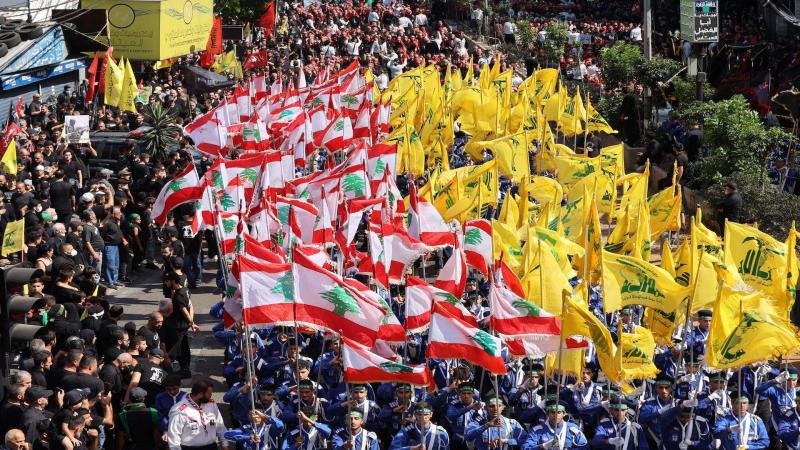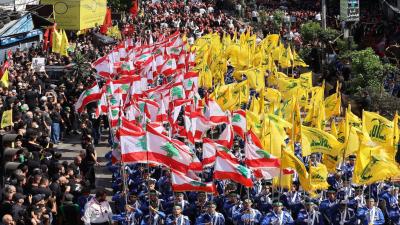Following Israel’s assassination of Hamas’s Deputy Political Bureau Chief Saleh al-Arouri in the heart of southern Beirut, many observers expected Hezbollah to respond to the Israeli operation with a force that exceeded the level of skirmishes that had prevailed since October 8. In the hours following the assassination, a heavy atmosphere settled across Lebanon in anticipation of Hezbollah's potential response to the Israeli strike within its territory. However, after Hezbollah Secretary-General Hassan Nasrallah delivered a speech on Wednesday night commemorating the fourth anniversary of Qassem Soleimani’s death near Baghdad Airport, it was understood from his remarks that “there is nothing new under the sun,” suggesting that Hezbollah would not escalate the conflict with Israel, and that there was no open war on the horizon.
Despite stating that “the crime of al-Arouri’s assassination will not go unpunished, and between us and you lies the battlefield with days and nights ahead,” he preemptively set expectations by saying that “what happened yesterday is very serious especially since the targeting took place in the southern suburbs, and we are now fighting on the front with precise calculations, paying a heavy price in the lives of our young men, and therefore if the Israeli thinks of waging war on Lebanon, our fight will then be unrestrained and without limits.” It was clear from this statement that the decision for a controlled confrontation within low thresholds with the Israeli army on the other side of the border remains in effect. This comes as Israel has overturned the rules of engagement that had existed between the two parties since the end of the July 2000 war through the assassination of al-Arouri in the southern suburbs, deemed the stronghold of Hezbollah.
Israel had previously escalated the confrontation in southern Lebanon by launching significant strikes that have so far resulted in the deaths of over 145 Hezbollah fighters and the destruction of dozens of homes and residential areas in most of the border villages adjacent to Israel. Furthermore, it expanded the scope of its strikes to reach 40 kilometers deep within the Lebanese-Israeli border.
In this sense, Hezbollah has failed to implement the theory of supporting the Gaza sector from the Lebanese front (according to the concept of "Unity of Arenas"), and its initiative to open a support front exposed the narrow margins within which it operates, based on the principle that the actual decision-making center is not in Beirut, but in Tehran. It has become clear that Iran is engaging in low-intensity skirmishes against Israelis and Americans through its regional proxies, with Hezbollah being the most prominent.
Thus, it appeared from Nasrallah's speech that its content was more justifying than alarming or threatening; rather, it seemed to be an effort to avoid escalating tensions at a bad time for him and the alliance he belongs to. U.S. President’s energy adviser Amos Hochstein is set to arrive in Lebanon at the end of this week, bringing with him a comprehensive U.S. project to initiate a new round of negotiations for demarcating land borders between Lebanon and Israel, similar to the maritime border demarcation that took place two years ago with Hezbollah’s participation and approval. The most significant aspect of the project Hochstein will carry involves proposing a solution for the occupied Shebaa Farms based on complete Israeli withdrawal from the area, after which its sovereignty would be transferred to the United Nations as a disputed territory requiring multilateral demarcation between Lebanon, Syria, and Israel.
Naturally, Hezbollah’s position following al-Arouri’s assassination reflected a preemptive attempt to align with a climate of settlement looming on the horizon between the Americans and the Iranians (contrary to the official rhetoric from both sides). This climate is based on an understanding not to expand the war in Gaza to other fronts. The first indications of this settlement climate involved ensuring the discipline of Iranian factions in general, and withdrawing the aircraft carrier Gerald Ford from the Mediterranean, in exchange for the Iranians withdrawing the majority of their factions positioned at the Iraqi-Syrian border as a gesture to reduce tension.
In conclusion, the concept of "Unity of Arenas" from Tehran to Gaza through Syria and Lebanon faces significant obstacles and is wavering under the weight of battlefield realities and the desire to produce interim settlements between the West and Iran. However, this does not preclude the possibility of fatal mistakes leading to the ignition of a regional war that most parties do not desire.




